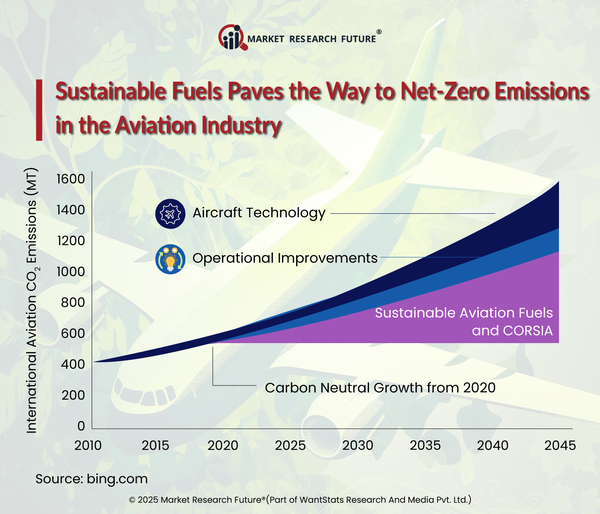Sustainable Fuels Paves the Way to Net-Zero Emissions in the Aviation Industry
The sector needs to reduce its environmental impact while addressing the growing demand for air travel, as it currently represents about 2.5% of global energy-related CO2 emissions by the end of 2025. Sustainable Aviation Fuels (SAFs) are essential for meeting these goals and lowering the sector's carbon footprint. The aviation sector faces immense pressure to achieve net-zero carbon emissions by 2050.
Green aviation Liquid fuels (SAFs) are made from sustainable feedstocks such as waste oils, agricultural residues, and non-food crops. SAFs are a primary weapon in addressing climate change since they recycle CO2 collected by biomass throughout their lifespan, unlike fossil jet fuel, which releases carbon previously stored for millions of years. According to a survey of 2025, SAFs may cut CO2 emissions by 80%. Thus, they are vital to aviation's goal of net-zero emissions by 2050.
The International Air Transport Association (IATA) has a roadmap toward net-zero emissions and shows the aviation industry's commitment to reducing emissions. IATA uses SAFs, new propulsion tech, and better air traffic navigation. Nonetheless, SAFs are projected to be the primary contributors to emission reductions; the fuel is estimated to be responsible for roughly 65% of the needed reductions to accomplish the aim by 2025.
SAF production has progressed, although the industry is still new. SAF manufacture will quadruple to 600 million gallons in 2023 while only accounting for 0.2% of global jet fuel demand. Production is estimated to reach 1.25 billion liters this year to accommodate future demand, a key turning point. The proper size of SAF production requires considerable infrastructure and technical investment.
Governments support speeding up SAF production—incentives for SAF production and other good policies lower costs and risk, boosting SAF demand. The ICAO's CAAF/3 agreement and the EU's ReFuelEU Aviation initiative defined SAF adoption goals: 2% by 2025 and 70% by 2050. US policy systems are evolving to help SAF development. The US and EU policies ensure SAF production growth by providing market incentives in 2025.
The aviation industry must engage with the public and business sectors to accomplish net zero. Corporate leaders must invest in SAF manufacturing technology and infrastructure while engaging with governments to maintain policy consistency. The momentum created today will be vital to the aviation sector's carbon-neutral goals by 2050, as the 2030s approach and government support are more prominent and SAFs grow more competitive with fossil fuels.SAFs are a commercial opportunity and an environmental need. Sector leaders must move decisively to shape sustainable aviation and ensure a stronger, more resilient industry for future generations.






